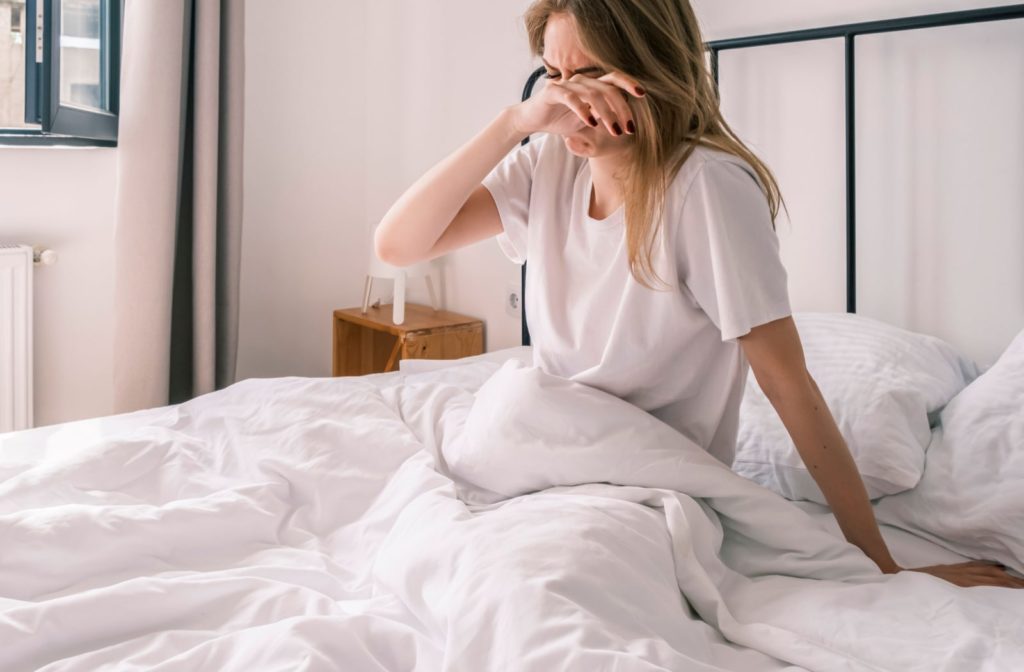Getting a good night’s sleep is important for so many things in life, and there’s nothing worse than waking up with dry eyes, or worse, tossing and turning all night because of them. Unfortunately, the reason why you’re waking up with dry eyes isn’t always simple. It could be from a variety of factors, such as a dry environment, allergies, tear quality, or an eye condition.
But on the bright side, dry eye treatments can help—there are several home remedies you can try. Persistent dry eye symptoms could be a good reason to visit your eye doctor, though. There could be an underlying reason you’re waking up with dry eyes that we can detect during an eye exam.
Possible Reasons for Dry Eyes in the Morning
There isn’t a one-size-fits-all answer for why you might wake up with dry eyes. There are simple answers, like dry air in your room, and more complicated reasons, like an eye condition called nocturnal lagophthalmos.
Dry Environments
Research shows a significant increase in dry eye symptoms among people who live in dry climates. During the day, you can take measures to keep your eyes moist with lubricating eye drops, but you can’t necessarily do that while you sleep. So, increasing the humidity in your room may be the best option for reducing symptoms while you sleep.
Allergies
Allergens, such as dust mites, pet dander, or pollen, can all lead to irritated, dry eyes. One might assume you could take allergy medications before you go to sleep to prevent allergies from affecting your eyes overnight. While that may work in some cases, it may also have the opposite effect, as antihistamines can cause dry eyes too.
Poor Tear Quality or Inadequate Tear Production
There are essentially 2 types of dry eye—evaporative dry eye and aqueous deficient dry eye. The first is the most common and is typically the result of an improper composition of the tear film that causes it to evaporate prematurely. The second is less common and is the result of your eyes simply not producing enough tears to keep your tear film intact.
Medications
Medications are one potential cause for waking up with dry eyes, and we don’t just mean antihistamines. There is a long list of medications that can potentially cause dry eyes, from antidepressants to anti-nausea medication to acne treatments.
This is a significant reason why it’s so important to let your eye doctor know which medications you’re currently taking—even if they aren’t related to your eyes. Your current medications may inform their recommendations concerning dry eye treatment.
Nocturnal Lagophthalmos
Ever heard the phrase, “sleeping with one eye open?” Turns out that’s actually a medical condition. Nocturnal lagophthalmos is the inability to close your eyelids completely while you sleep.
Our eyelids help prevent the evaporation of our tear film when we close our eyes, and they also help our tears spread evenly across our eyes. When we can’t close them fully while asleep, that can lead to dry eyes.
In addition to dry eyes, nocturnal lagophthalmos is also linked to poor sleep quality and exposure keratopathy—damage to your cornea that can require emergency intervention to prevent blindness.
Morning Dry Eye Home Remedies
There is no magic cure-all remedy for dry eyes because it ultimately comes down to the cause. It’s important to see your eye doctor if you have persistent dry eye symptoms that won’t go away, because there could be an underlying condition that requires treatment.
There are also several things you can try at home if you’re only experiencing occasional morning dry eyes.
Some potential home remedies include:
- Adding a humidifier to your room to increase humidity levels.
- Keeping windows closed during allergy season when there are a lot of allergens in the air.
- Washing your bedding, especially pillowcases, regularly.
- Using lubricating eye drops. If you’re using them a lot, it’s important to speak with your eye doctor about their continued use.
- Increasing your intake of vitamins A, D, and B12.
- Consuming a healthy amount of Omega-3 fatty acids.
- Staying hydrated—have a glass of water first thing in the morning.
- Avoiding excessive alcohol consumption.
- Quitting smoking.
- Using a warm compress on your eyes and cleaning your face before sleeping.
Discuss Dry Eye Treatment Options with Your Eye Doctor
There isn’t always a straightforward cause for waking up with dry eyes, and it could even be a result of more than one factor. There are additional treatment options your optometrist can provide if you can’t find relief by trying some of the home remedies we’ve discussed.
We must examine your eyes before we can recommend more advanced dry eye therapy treatments like prescription eye drops or iLux treatments. Give our team at Doctors EyeCare Grande Prairie a call today if you’re tired of waking up with irritated eyes, and book an appointment with us to take the first step toward dry eye relief.




